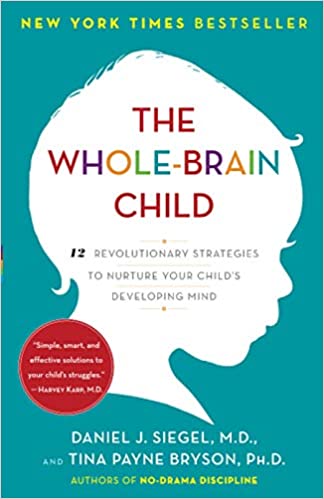Mini Book Review #22: The Whole Brain Child: 12 Revolutionary Strategies To Nurture Your Child’s Developing Mind, by Siegel and Bryson.
Is parenting a matter of simply understanding the brain? The authors of Whole Brain Child wouldn’t make that claim, but they do believe that their findings on brain development and integration will help parents engage more effectively with their children. This book speaks mostly to parenting children from the toddler years to the preteen years. That’s when neural connections form and strengthen at incredible speeds.
Not all of their suggested strategies for approaching and calming an angry child might be correct. (They don’t avoid negotiations with toddlers.) However, I was intrigued and convinced by their descriptions of the difference between how to manage an “upstairs tantrum” (in which the child still has reasoning ability and is simply trying to manipulate you) and a “downstairs tantrum” (in which a child almost literally “loses his mind”). I’ve cared for children experiencing both types of meltdowns and agree that this a great way to differentiate.
Siegel and Bryson also coach parents through helping children overcome unreasonable fears (through storytelling of past events, mainly). I have already used this technique to help my little daughter. They provide multiple real-to-life examples of negative and positive ways of managing a situation with a stressed, angry, or defiant child.
My Take on The Whole Brain Child
I don’t believe that parenting is a simple matter of science. For me, the Bible is my only true authority. However, the Bible doesn’t always give us specific instructions for parenting questions. That’s why we pray for wisdom. And, perhaps, some wisdom can be gleaned by studying the intricate structure of the brain God designed.
My favorite part about The Whole Brain Child was the message that the important thing in parent-child relationships is maintaining the bond of trust and love. Not maintaining authority or autonomy, but teaching empathy and an awareness that our emotions are important but do not have to control us.

